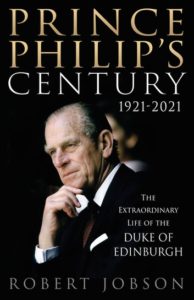 2021 - Robert Jobson
2021 - Robert Jobson ISBN: 978191372113
📕 Purchase this book
Status: Completed
Date Completed: 06/12/2021
Bookshelf: eBook Subscription
My thoughts
It was only a few months ago now that we received the unfortunate news of the passing of the Duke of Edinburgh; consort to Queen Elizabeth, founder of the Duke of Edinburgh’s award programme, patron of countless organizations, and someone that has attended tens of thousands of public engagements in his lifetime for the benefit of the Commonwealth nations of the world. In the aftermath of his passing I watched his deliberately modest funeral to hear the things commentators were saying, and to read this book. This exercise was an attempt on my part to more fully understand his legacy. Nothing came as a surprise or disrupted my preconceptions of the type of man Prince Philip was, but the extra detail provided in this book convinced me even more that he was an exemplar for us all in many ways.
The first thing that stood out for me from Prince Philip’s character was his work ethic.
The next thing standing out for me has been the Duke of Edinburgh’s focus on outcomes/objectives, rather than self-promotion or personal benefit.
I came away from this read with a reinforced sense of the values that Prince Philip lived and espoused throughout his life. He undoubtedly lived a very long life of service to Canada, the United Kingdom, and the Queen’s other realms. This included his military career, founding of the Duke of Edinburgh’s Award, his role in founding the World Wildlife Foundation, and literally hundreds of other patronages and memberships, in addition to his very personal dedicated support to his wife and family. He didn’t mince words, he put his foot in his mouth a number of times, but he was modest, self-effacing, deeply committed to his family, and tried to make everyone he came into contact with feel at ease. He is perhaps most commonly summed up characteristically as someone that “just got on with it.”
Annotations and Highlights
Chapter 9 | LinkPhilip was not someone prone to brooding about an issue. Once a decision was made, it was done, he saw no point in looking back. He was, after all, one of life’s doers.
Chapter 14 | LinkMichael Flanders, ruminated on the importance of the crown […], ‘Monarchy does not lie in the power it gives to the sovereign, but in the power it denies to anyone else.’
Chapter 16 | LinkIt follows that whatever the moral reasons for conservation it will only be achieved by the inducement of profit or pleasure.
Chapter 26 | LinkHis son, Prince Edward, Earl of Wessex, put his father’s rather irascible response down to his modesty. ‘My father, plain and simply is very modest about himself and doesn’t believe in talking about himself. One of his best pieces of advice he gives to everybody is to talk about everything else, don’t talk about yourself. Nobody is interested in you.’
Leave A Comment